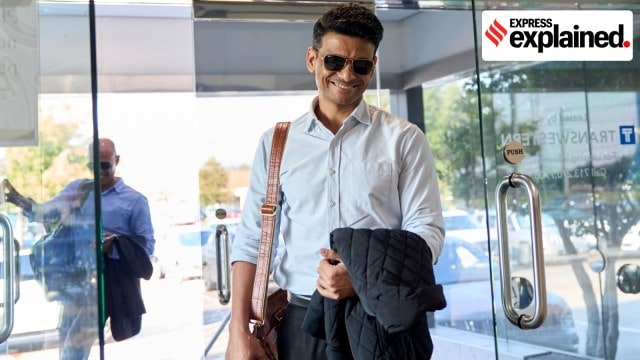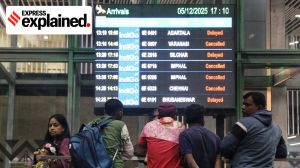Who is Shubhanshu Shukla, the first Indian set to travel to International Space Station?
Born in Lucknow, Uttar Pradesh, on October 10, 1985, Shuka is an alumnus of the National Defence Academy (NDA), Pune. He was commissioned into the Indian Air Force (IAF) fighter wing in June 2006
 Shukla has 2,000 hours of flight experience across various aircraft, including the Su-30 MKI, MiG-21, MiG-29, Jaguar, Hawk, Dornier, and An-32. (Photo: Axiom Space)
Shukla has 2,000 hours of flight experience across various aircraft, including the Su-30 MKI, MiG-21, MiG-29, Jaguar, Hawk, Dornier, and An-32. (Photo: Axiom Space)Group Captain Shubhanshu Shukla is set to become the first Indian astronaut to travel to the International Space Station (ISS). He has been picked to pilot the upcoming Axiom Mission 4, which is being organised in collaboration between private US space company Axiom Space and the National Aeronautics and Space Administration (NASA).
Speaking at an online press conference about the mission from the US, Shukla said, “Our endeavour is to execute this mission with utmost professionalism. I also hope to ignite the curiosity of an entire generation in my country through my mission and drive the innovation that would make many such missions possible in the future.”
Here is a look at who Shukla is and what the Axiom Mission 4 is.
Who is Shubhanshu Shukla?
Born in Lucknow, Uttar Pradesh, on October 10, 1985, Shuka is an alumnus of the National Defence Academy (NDA), Pune. He was commissioned into the Indian Air Force (IAF) fighter wing in June 2006, and became Group Captain in March 2024. Shukla has 2,000 hours of flight experience across various aircraft, including the Su-30 MKI, MiG-21, MiG-29, Jaguar, Hawk, Dornier, and An-32.
After receiving a call from the Indian Space Research Organisation (ISRO) in 2019, Shukla underwent rigorous training at the Yuri Gagarin Cosmonaut Training Center in Star City, Moscow, Russia. In February 2024, the pilot was picked as the prime astronaut for ISRO’s maiden human spaceflight mission, Gaganyaan, scheduled for 2026.
What is the Axion Mission 4?
The mission, which is slated for “no earlier than Spring of 2025”, involves taking four astronauts — Shukla, Slawosz Uznanski-Wisniewski from Poland, Tibor Kapu from Hungary, Peggy Whitson from the US — to the ISS. The crew will travel in SpaceX Crew Dragon spacecraft. The astronauts will stay at the station for 14 days.
During the press conference, Shukla said, “While we are in the station for two weeks, we will be performing several scientific missions and conducting several outreach events. I know that right now an entire team is working to ensure that every minute we spend on the station is scheduled for activities to optimise our time there.”
To prepare for the mission, the astronauts underwent training at the European Space Agency (ESA), Japan Aerospace Exploration Agency (JAXA), and Japan Manned Space Systems Corporation (JAMSS). The initial training was carried out at ESA’s European Astronaut Centre in Cologne, Germany. There the astronauts learned about the communication systems, and emergency response procedures and conducted research activities inside the Columbus module of the ISS.
Columbus is a European module of ISS that has a versatile laboratory for interdisciplinary research in microgravity. India’s space agency along with the Department of Biotechnology have been working on developing space biology experiments that may be carried out on-board Axiom-4.
Afterwards, the crew underwent training at JAXA’s Tsukuba Space Center in Japan, where they were trained on the operations of the Japanese Experiment Module Kibo. The training included in-depth knowledge about the module’s capability.
- 01
- 02
- 03
- 04
- 05






































